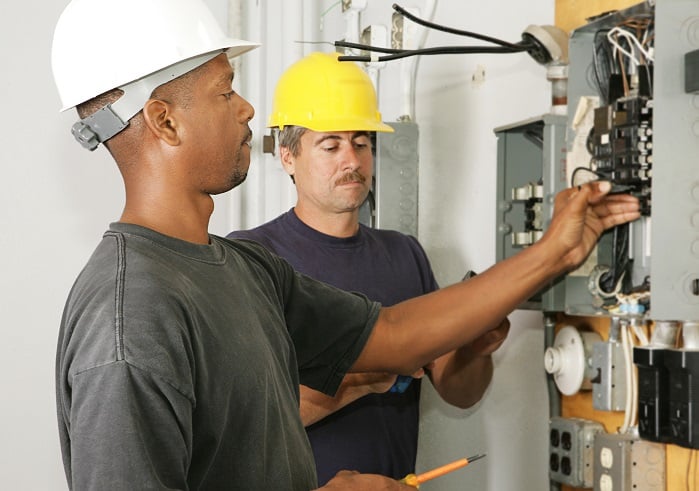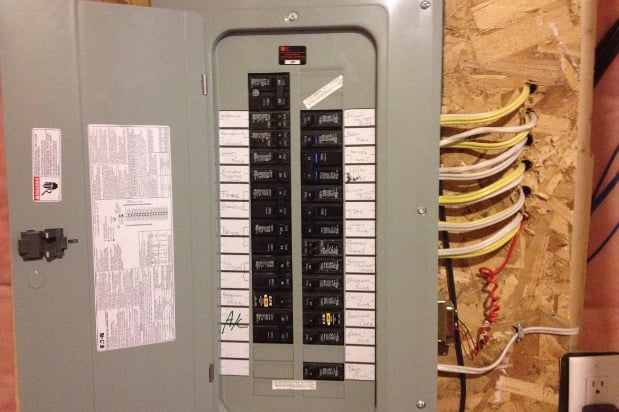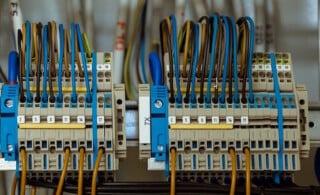
Looking for an Electrician for Hire?
Whether you’re doing a home remodel or simply fixing a flickering light, you’re probably looking to hire an electrician. This guide walks you through everything you need to know to confidently hire a licensed professional. You’ll learn about how much electricians charge and why they cost what they do. You’ll understand the difference between an Apprentice, Journeyman and Master Electrician. There are some excellent tips to keep the project cost down while also diving into what projects they do and which you may need a specialist for. Maybe most importantly, you’ll learn what questions to ask your electrical contractor before a job starts and after it ends.
On This Page:
- Common Electrical Projects Requiring a Pro
- How to Hire an Electrician
- Electrician Cost Per Hour
- Tips for Hiring an Electrician
- Questions to Ask
- FAQs
Common Electrical Projects
Every home needs electrical repairs from time to time, but because of the dangers involved, these repairs don’t make safe do-it-yourself projects. Most folks will be better off hiring professional electricians.
Electricians do a fair amount of larger remodeling and new construction projects but also common residential projects including:
- Installing a light fixture or chandelier.
- Installing a ceiling fan.
- Adding an outlet.
- Updating or replacing a circuit breaker.
- Installing or updating an electrical panel.
- Adding outdoor lighting and other electrical features.
For cost information related to the above tasks, visit our Electrical Cost Guide.
How to Hire an Electrician
Knowing how to hire an electrician involves a little reading and research combined with knowing the right questions to ask. Follow these steps before you make that first call.
- Read this article.
At the very least, go through the list of questions, tips and FAQ’s we’ve included. Arming yourself with the best information gives you the tools and confidence to get the right professional for the job. Understanding basic electrical wiring will help you understand the problems in your home. - Research Costs.
Familiarize yourself with the typical costs per hour for electrical work below. But don’t stop at this article. Dive into specific costs unique to your project. Knowing what charges to expect puts you in a better spot when the bids and bill come in. - Check Reviews.
Browse our directory to find local professionals near you, read reviews and get multiple quotes and callbacks. Reviews are a wonderful way to narrow your search. You can also find this feature in our app. - Speak with several professionals.
Don’t take the first bid. Always get at least 3 bids for your project. Talk with each professional and ask them targeted questions about your project and situation. You can find a list of suggested questions below. - Check your professional’s credentials.
In almost all cases, anyone working on your home needs a valid license and insurance. If you’re unsure of a pro’s licensing, find another reputable professional.
Ready to start your Electrical Work?
Find ProsReturn to Top
How Much Does an Electrician Cost Per Hour?
An electrician’s cost per hour comes in between $50 and $100. It’ll vary depending on your location and the type or professional you hire. Areas with a higher cost of living can expect to pay on the higher end of that scale. Licensing level may also increase the price.
Usually you’ll pay a higher rate for the first hour. This covers their travel and time expense. Emergency or after-hours rates are usually higher too – expect to pay an emergency fee of up to $300 plus a higher hourly rate.
5 Quick Tips for Hiring an Electrician

Electrician services are a necessary part of homeownership. Whatever the job, large or small, the bill can add up rapidly. Because these services are expensive, here are some tips on how to get the most bang for your buck:
1. Don’t Be Misled by an Electrician’s Hourly Rates
Many people pay too much attention to the hourly rate electricians charge. This amount can vary from $50 to $100. The hourly rate only has meaning when it is considered along with the firm’s work quality, equipment and experience.
A truly skilled, well-equipped professional with a truck full of parts that charges $100 an hour can be a much wiser choice than an inexperienced hack, working with inadequate tools and no parts, but charging much less. Often, more experienced professionals get the job done quickly with warrantied work.
2. Compare Travel Charges
Rates reflect travel times. Travel charges can have a big impact on your costs and are in some ways easier to compare than hourly rates. Many electricians spend a third or more of their time navigating traffic on their way to a jobsite. Every contractor must find a way to pay for the expense of driving each day.
Travel charges include:
- a higher rate for the first hour
- a flat “trip charge”
- a minimum for each visit
- a higher overall hourly rate.
When you first call the professional, ask how and what they charge and see if it makes sense for your situation. For example, a trip charge and a relatively low hourly rate make sense on a longer job. For a shorter job, you’ll do better with someone who absorbs travel costs by charging a higher hourly rate.
3. Bundle Repair Jobs Together
To save money and time on electrical repair work, bundle projects together. Any time you discover an electrical problem, put it on a list.
When you feel it’s time to call a pro, review your list and then conduct a mini-inspection of your home. Look for faulty switches and dysfunctional or crowded outlets. When the electrician comes, you’ll save money and time by getting everything taken care of at once.
4. How to Prepare & What to Know Before the Electrician Arrives
The less time the electrician spends dealing with inconveniences, the more money you will save.
Some preparation tips:
- Be as thorough and detailed in describing your needs to your contractor. The more they know, the quicker the job will go.
- Before they arrive, prepare a precise list of items you want serviced. Electricians have budgeted their time for a service call. They don’t have time for additional requests once they are on site.
- Make sure the electrical panel box is accessible. You’ll pay for the time it takes to access it.
- Clear away fragile items, knickknacks and furniture from areas where you expect the them to work.
- If you have questions about the project, ask them before they start. Most are happy to run you through the problem and the process of fixing it.
- Ask about potential issues after the work is complete. During a service call a professional will spot any potential hazards.
- You’ll lose power to parts of your home while they work. Be prepared to pause anything you’re doing during the service call.
- In most cases you’ll have the option to either pay at the time of service or have a bill sent to you. You’ll be able to pay with cash, credit and sometimes check.
A typical project involves:
- Clearing or gaining access to the problem area.
- Diagnosing the problem.
- Shutting the power off at the service panel.
- Repairs or installation. This may also include leaving for parts.
- Clean up.
5. Install Money-Saving Electrical Fixtures
- By switching from ordinary incandescent light fixtures or bulbs to fluorescent or LED ones, you can substantially reduce energy consumption in your home.
- Motion detector switches can help you save money on outdoor lighting while at the same time providing very cost-effective security to your home.
- Creative landscape lighting and indoor accent lighting can make your home more appealing to you, your guests and potential buyers in the future.
Ready to start your Electrical Work?
Find ProsReturn to Top
Question to Ask an Electrician

Asking questions is the best way to find a qualified electrician. Before you have anyone come into your home for expensive repairs, interview them first. Ask your potential contractor these questions:
- Do you have a license to perform electrical work in this state?
All states require an electrical license or work performed under a Master Electrician. You should also ask how many on the job hours of experience they have. - Do you have insurance?
Never use one who isn’t insured. You can ask to see proof of insurance. - Do you have prior work references?
You might skip this for small jobs like installing a light or outlet. For larger projects, always get references. - What are your rates?
Always ask up front. Getting a detailed quote up front is the best way to go. - Who is going to do the actual work?
Often, a Master Electrician will come out to diagnose and bid on projects, but they have their apprentice and journeyman electricians do the work. This isn’t a terrible thing, in fact it’s common practice. The Master’s license is on the line with any work he supervises. - Is your work warrantied or guaranteed?
Any reputable company or contractor warranties their work, usually for at least a year. - Are you usually on time?
Overbooking is a frequent problem with electrical work. Often, a service call goes long, and they end up showing up at your home late. This common complaint is easily remedied with an up-front and honest discussion. If they can’t be on time, make sure they’ll call.
Ready to start your Electrical Work?
Find ProsReturn to Top
FAQs
What does an electrician do?
There is often some confusion about the type of work these professionals do. They only work on electrical systems such as outlets, lighting fixtures and electrical panels – they aren’t appliance repairmen.
What are the different types of electricians and what do they do?
Are you supposed to tip an electrician?
What education and certifications do you need to become an electrician?
How much do electricians make?
Do I need to hire an electrician?
How do I find a good electrician?
Ready to start your Electrical Work?
Find ProsReturn to Top
 Knowing When to Call an Electrical Wiring Contractor
Knowing When to Call an Electrical Wiring Contractor  Preventing Home Improvement Fraud
Preventing Home Improvement Fraud  Powerful Electrical Upgrades
Powerful Electrical Upgrades  What to Know When Hiring a Fence Installer
What to Know When Hiring a Fence Installer  Professional Carpet Cleaners vs. DIY Rentals: Which Works Best & How to Find a Pro
Professional Carpet Cleaners vs. DIY Rentals: Which Works Best & How to Find a Pro 

I really liked your tip to leave electrical work to the professionals because electrical systems are potentially hazardous. I am finishing the basement in my new home, and I need to set up the electrical system for the lights and power outlets. I will be sure to call a professional to route the wires for me so I will not be in any sort of danger.
I really liked your tip to hire an electrician for any maintenance that needs to be done on anything electrical because it could be hazardous for someone who is not experienced in electricity. I was going to replace a light switch in my home, but now reading that it is hazardous, I will find someone to do it for me. I will be sure to call a qualified electrician.
A qualified and a good review from his/her previous or recent customers is a good factor to see when one wants to get a competent electrical person/company. Safety and proper knowledge from the people you hire is a must.
Another handy tip is to get at least three quotes from a minimum of three electricians and make sure that your quote is broken down into the real work that the electrical contractor will be doing, the quantity of time it will take to do the task and the product costs for any parts.